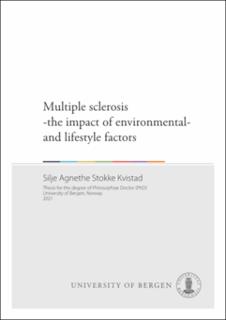Multiple sclerosis -the impact of environmental- and lifestyle factors
Doctoral thesis

Åpne
Permanent lenke
https://hdl.handle.net/11250/2737099Utgivelsesdato
2021-04-15Metadata
Vis full innførselSamlinger
Sammendrag
Background:
Multiple sclerosis (MS) is a chronic inflammatory disease of the central nervous system (CNS), likely caused by an interaction of genetic and environmental factors. Epstein-Barr virus infection, low serum vitamin D levels, smoking and obesity increase the risk of MS. However, knowledge of their effect on disease activity and progression have been limited.
Objective:
The main objective was to explore the role of different environmental and lifestyle factors for MS disease activity. In more detail, we sought to evaluate whether there is an association between tobacco use or body mass index (BMI) and MS disease activity. We also explored the potential of two adipokines, leptin and adiponectin as biomarkers for disease course or interferon-beta (IFNβ) treatment response in MS.
Methods:
All data in our studies were based on the OFAMS study, a randomized placebo-controlled multicenter study of 92 patients with relapsing-remitting MS (RRMS) that was conducted between 2004 -2008. The patients were followed for 24 months with repeated magnetic resonance imaging (MRI) of the brain, blood tests and clinical evaluations, 6 months prior to and 18 months during IFNβ-treatment.
For the current thesis, we analyzed serum samples for cotinine, a biomarker for tobacco use, and the adipokines leptin and adiponectin. For the first study, the patients were categorized as tobacco-users and non-tobacco-users according to their serum cotinine level. For the second and third study, patients were categorized based on the World Health Organisation (WHO) classification of BMI into three groups; normal weight patients (BMI< 25 kg/m²), overweight patients (BMI 25-30 kg/m²) and obese patients (BMI >30 kg/m²). All analyses were adjusted for age, gender and BMI.
Results:
We did not find any association between tobacco use and MRI activity (paper I). Further, there was no difference between tobacco users and non-tobacco users regarding baseline Expanded Disability Status Scale (EDSS) score, EDSS-progression or relapse-rate. For tobacco users, there was no correlation between serum cotinine levels and disease activity.
There was no difference in clinical and MRI activity between patients stratified by BMI prior to IFNβ-treatment. During IFNβ-treatment, 80 % of overweight or obese patients had MRI activity compared to 48 % in the group of normal weight patients (p=0.001). The number of patients obtaining NEDA (no evidence of disease activity)-status differed according to BMI; 26 % in the normal weight group compared to only 13 % in the group of overweight and obese patients (p=0.05) (paper II).
There was no association between serum levels of leptin or adiponectin and MRI disease activity (paper III). The serum levels of leptin were lower and the levels of adiponectin higher during IFNβ-treatment compared to the treatment-naïve period, reflecting the anti-inflammatory effect of the drug.
Conclusion:
In our studies, we found no direct association between tobacco use or BMI and MS disease activity. During IFNβ-treatment fewer of the overweight and obese patients obtained NEDA-status compared to patients with normal weight, indicating that BMI could affect IFNβ-treatment response. Serum levels of leptin and adiponectin seem not to be suited as biomarkers for disease activity or IFNβ-treatment response in MS.
Består av
Paper I: Kvistad SS, Myhr KM, Holmøy T, Benth JŠ, Løken-Amsrud KI, Wergeland S, Beiske AG , Bjerve KS, Hovdal H, Lilleås F, Midgard R, Pedersen T, Bakke SJ, Torkildsen Ø. No association of tobacco use and disease activity in multiple sclerosis. Neurol Neuroimmunol Neuroinflamm, 2016 Jul 14;3(4):e260. The article is available at: https://hdl.handle.net/1956/15743Paper II: Kvistad SS, Myhr KM, Holmøy T, Benth JŠ, Wergeland S, Beiske AG, Bjerve KS, Hovdal H, Lilleås F, Midgard R, Pedersen T, Bakke SJ, Michelsen AE, Aukrust P, Ueland T, Sagen JV, Torkildsen Ø. Body mass index influence interferon-beta treatment response in multiple sclerosis.. J Neuroimmunol. 2015 Nov 15;288:92 -7. The article is available in the thesis. The article is also available at: https://doi.org/10.1016/j.jneuroim.2015.09.008
Paper III: Kvistad SS, Myhr KM, Holmøy T, Benth JŠ, Wergeland S, Beiske AG, Bjerve KS, Hovdal H, Midgard R, Sagen JV, Torkildsen Ø. Serum levels of leptin and adiponectin are not associated with disease activity or treatment response in multiple sclerosis. J Neuroimmunol. 2018 Oct 15; 323:73-77. The article is available in the thesis. The article is also available at: https://doi.org/10.1016/j.jneuroim.2018.07.011